 I acutely remember being painful shy as a child; it wasn’t fun. Any other shy gals out there? If so, you know what mean.
I acutely remember being painful shy as a child; it wasn’t fun. Any other shy gals out there? If so, you know what mean.
If I could to help my own kids have a smoother time making friends and navigating the social scene, that would be such a blessing. So when Patricia Evans of the Huffington Post UK Blog asked if she could share her excellent article about easing friendship-making with shy kids, I was delighted! Please welcome her below and read on for some wonderful information and tips about helping your kids break out of their shells.
And make sure to follow along with Patricia on Twitter too for more of her savvy insight!
**********************************************************************
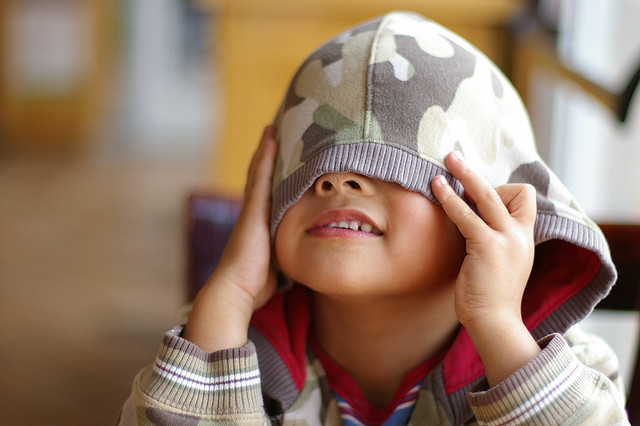
Photo by Jill Encarnacion via Flickr
Why do some kids get shy and others are extremely outgoing? Before we get into this, let’s figure out what being shy really means. Children who are considered shy are usually those who are highly sensitive and strongly affected by their environment. Some kids are introverted, it’s not that they don’t want to get along with others; they just need to take the time away from people to restore their energy. Others are much more interested with their own project and ideas that they would rather play alone than interact with other kids. All of these types of shyness have a common factor – they very much wanted to connect socially but feel awkward and anxious in doing so.
When a kid is not participating and is having a hard time in making friends, parents immediately think that their kid needs to get help in overcoming his shyness. Being shy is not a problem; it’s a personality trait that many people don’t understand. They believe that when a child is shy, he is probably suffering from poor self-image. While this is not often true, we still want our children to go out there and make friends. So what’s the best way in supporting your child to respond socially?
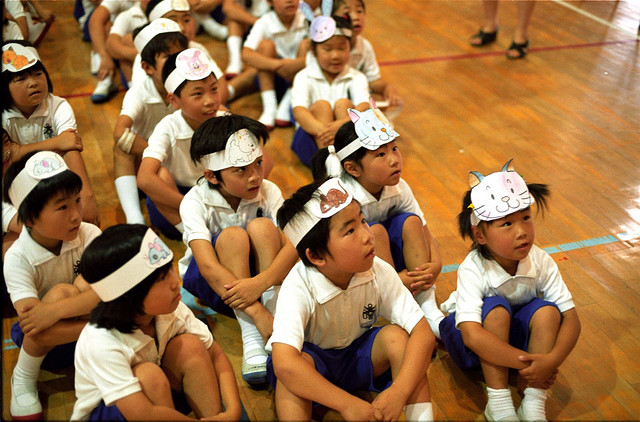
Photo by Aka Hige via Flickr
Observe How He Reacts In Every Environment
Before making any move, observe your child first and see if he acts this way in every situation, at all times. Does he get excited in joining the soccer team but gets quiet and hesitant when he arrived at the first practice? Does he want to join a group of kids playing at the school playground but quietly walks away because he doesn’t know how to approach them? He may be active and expressive at home and with his close friends but doesn’t feel good in approaching new kids.
Let Him Express His Thoughts
Talking is a recommended stance of collaboration. Asking him his concerns and seeking solutions together could be a great start. Don’t just ask how his day went. Usually, some kids feel that telling their parents about their day felt more like an obligation than a sincere question. He can differentiate if you’re just hearing the words that come out of his mouth or if you’re really listening to him. Let him build his trust on you. Let him feel that you will listen to him no matter what he says.
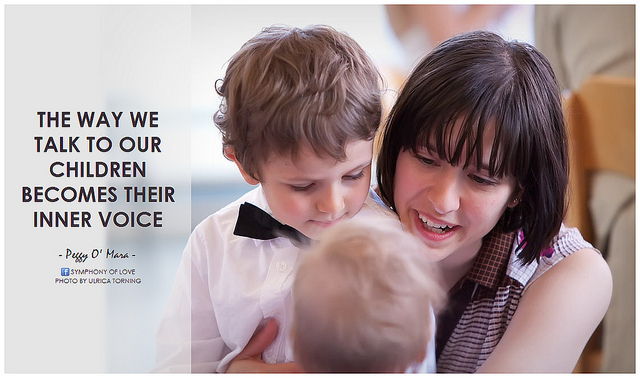
Photo by BK via Flickr
Be Clear With The Don’ts and Can’ts
Maybe the reason why he’s not getting out there is because he’s hearing too much negative words from you.
“You can’t go.” “Don’t do that.”
Hearing these negative words can limit your child because he fears of rejection and disapproval. Even if you are pertaining to his older brother or sister in that matter, he might think that you won’t allow him when he asks for your permission. Make it clear to every member of the family what is allowed and what is not in the household. Set rules and boundaries to avoid conflict and confusion.
Play Early
School Family’s Patti Ghezzi mentioned common characteristics in a child’s social growth at each grade level. At kindergarten a child might consider everyone as friend but when he reaches 3rd grade, he’s becoming more selective in choosing friends and shares less about his social life.
As early as possible, structure your child’s schedule. Make sure to allot ample amount of time in play and social activities. Get him involved in school activities and play dates. Psychotherapist Tammy Gold advises parents that helping kids bond can be done without making them feel that a friendship is being forced. By letting your kids get outdoors in a local playground or inviting other kids from school in a sleepover or picnic will do.
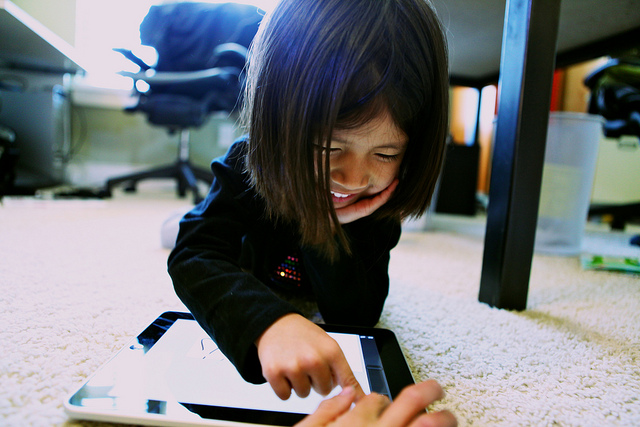
Photo by Marcus Kwan via Flickr
Technology Limits Participation
One common reason why kids get shy is due to the overuse of technology. TV and computer plays a big factor why kids become socially awkward. PlaygroundEquipment.com revealed that 40% of kids prefer TV and computer over outdoor play. Failing to engage in physical activities can lead to weight gain, speech impediment, and lack of social interaction. As a parent, you have to ensure that your kid gets generous amount of outdoor play over TV and computer games.
Motivate Him By Starting Small
If you feel that he is not yet ready in making friends with a bunch of kids at once, let him start with one friend that he can rely on. If he’s in a situation where he feels shy, help him overcome his fears by reminding him that it’s okay to take a while in warming up in a new situation or by citing previous events where he has overcome his shyness. For instance, telling him about that last birthday party where he held your hand all throughout the games but ended up having lots of fun with other kids can be a great motivation.

Photo by Anna Levinzon via Flickr
Team Up With Fellow Parents
Parents often drive the connection in introducing kids to another child. Making friends with a fellow parent in the community can be of big help to you and your child. The other parent might be struggling with the same hurdle and you can help each other out by exchanging solutions or by making your kids get together on a play date. Building a positive relationship with another parent can set an example to your kid in doing the same.
Role Play
More often than not, kids tend to get shy because he or she doesn’t know what to say or what to do when confronted by the situation. Sometimes, it is okay to feed him with words that can help him open up in situations. “I like ___ because ___. Can I help you ____?” is a great opening sentence to rehearse with your kids, says Julia Simens, author of Emotional Resilience and the Expat Child.
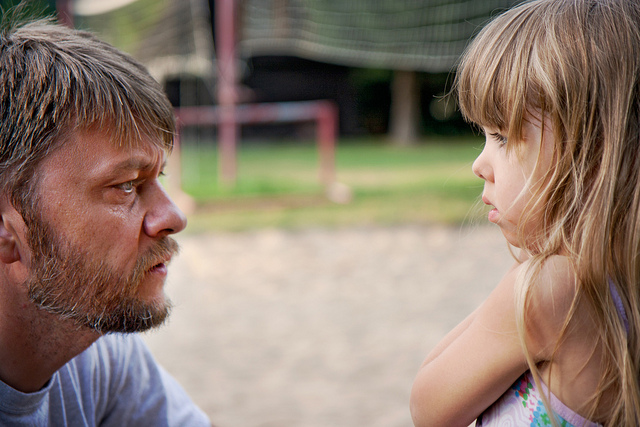
Photo by Phil Dragash via Flickr
Exercise this sentence with your kid using different situations. Your child could say, “I like your truck because it can turn into a robot. Can I help you assemble the rest?” He will be less likely to be turned down by other kids when he is positive and specific.
Shake It Off
Remember, being shy is okay. Every child is unique in his own way and being shy might also be a part of his unique trait. Most people see shyness as a disadvantage especially in social situations where an outgoing child excels more. The shy child on the other hand feels anxious and isolated due to the treatment that he might be receiving.
Social contact is one of the most important human needs that can impact our emotional and physical health in every stage of our lives. Though kids can learn to manage social anxiety, speak up for themselves, and connect happily with others at some point, they still need a little extra support from their parents in helping them become more socially comfortable.
***For more thoughts on this topic, check out this great dicussion on VProud.tv!***
First image credit: depositphotos.com, image ID:17214739, copyright:ababaka
Latest posts by Meredith (see all)
- Bushcraft Camping: How To Master The Art Of Wilderness Living - April 21, 2025
- The Dollhouse Academy Book Club Discussion - February 14, 2025
- Somewhere Beyond the Sea Book Club Discussion - January 10, 2025


Janine Huldie says
Great advice!! I was a shy kid, but definitely not so much as an adult. My older daughter is also on the shy side, but I have so far tried my best to encourage her to join in things with her friends and kids her own age and for the most part, she truly has, but when she if rest getting to know others and such she can be on the more quiet, shy side for sure. Will definitely have to keep your thoughts and advice here in mind now more. Thanks.
Meredith says
That’s exactly how my son is, Janine! The new situations are the tricky ones.
Kathy at kissing the frog says
Great tips! Totally going to keep these in mind when dealing with my more mellow guy.
Meredith says
Hope they help, Kathy! I have a very mellow dud here too.
Cynthia Gabriele Sprouts Consignment Boutique says
GREAT PIECE!
Meredith says
Thanks for reading, Cindy!
Fabiola Rodriguez says
What a wonderful post! I was extremely shy as a child, and my teachers even suggested therapy but my parents refused. They let me be myself, get involved in any activity or project that interested me and never pressured me to make friends, letting me friend just one or two kids at a time. I grew up fine, and now I am able to teach and even speak in public. My youngest child, my daughter, is shy too. She’s about to start preschool, so I will need to help her adjust to this new enviroment. I would like to be as patient as my parents were, but I also feel the pressure from other adults, parents and teachers, that treat shyness as a disadvantage. I am determined to let my little girl be herself, as mellow or as cheerful as she wants to be, and be around to encourage or comfort her as needed. I know she is shy, but that is a part of her personality and I love her for it.
Meredith says
Aw, Fabiola, thank you for sharing this! Hear hear! Here’s to letting kids be who they are, and I love that you are following in the smart footsteps of your parents. Here’s to your own beautiful little girl!